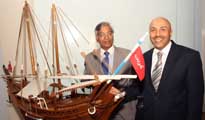|
 |
|
Ambassador of Kuwait Sami M. Al
Sulaiman and director general of ICCR Suresh Goel pose with a
replica of an ancient Kuwaiti trading vessel.
(Photo: Amlan
Paliwal) |
New Delhi: A week-long
panorama of Kuwaiti culture which opened in the capital May 15 has
for the first time brought arts, crafts and performing traditions
of the ancient port-nation to India to strengthen people-to-people
cultural ties between the two countries.
The culture showcase, presented by the Indian Council for Cultural
Relations (ICCR) and the Embassy of Kuwait will move to Jaipur
from the capital before closing May 19.
"The festival is a reciprocal gesture by Kuwait in response to a
Festival of India in Kuwait in 2009. Kuwait and India share
similar Islamic influences in architecture, tradition, festivals
and rituals. The two countries share ancient trade links as well.
Kuwait is one of the most peaceful countries in the Gulf region,"
director-general of ICCR Suresh Goel told IANS at the inauguration
of the festival.
"Ties in the contemporary context are more people-centric with a
large number of Indian people working in Kuwait and adding value
to its economy and social structure," Goel said.
Independent surveys say nearly 600,000 Indians are currently
living in Kuwait, a source in the embassy said.
The Kuwait Cultural Week opened with an extravagant exposition of
Kuwaiti art, textiles and handicrafts at the Lalit Kala Akademi.
A section devoted to the maritime history of the country featuring
replicas of ancient schooners and diving and trading vessels drew
visitors. The sturdy boats with multiple white sails were crafted
in wood.
Miniature boat crafting is an important cottage industry in the
country.
"Kuwait had different types of ships used for a variety of
purposes like travelling, diving for pearls and fetching drinking
water from Iraq and Iran. Large trading vessels sailed to India
for business in wood, spices, timber, rice and textiles. Ships are
vital to our nation's maritime heritage," Talat-al-Sultan, who is
heading the Kuwaiti media delegation, told IANS.
He said, "Several marine clubs along the coast keep the traditions
of diving and rowing alive by teaching enthusiasts and conducting
diving competitions."
Diving for pearls was an important occupation of ancient Kuwait.
An exhibition of contemporary art exhibiting works by leading
artists showed a perceptible Indian influence in art and idiom.
"We have integrated several Indian artistic traditions in our
culture. Kuwaiti artists and filmmakers who visited India have
brought back Indian influences to Kuwait and blended it with
Kuwait's traditional art," Kuwaiti Ambassador Sami M. Al Sulaiman
told IANS.
Sulaiman said, "The Kuwaiti cultural week was meant to be a bridge
between Kuwait and Indian society."
"The two countries share excellent relations politically and
economically. But we cannot forget culture. Kuwaiti citizens have
been living in India for more than 100 years - for trading. They
have integrated with the Indian society."
The ambassador, a self-proclaimed Indophile, is fond of Indian
classical dances like Kathak and Odissi.
Another attraction of the festival was a concert by Kuwaiti TV
band - one of the country's oldest all-man television band which
has been performing both in the country and abroad since 1978.
At a concert Tuesday, the 16-member band attired in the customary
"dishdasha" sang traditional sea and folk music to the beat of
hand drums and a lyre-like string instrument.
"Three different genres of traditional music form the basis of the
country's Spartan musical history. The Khammari is a slow music
with heavy beats while the Samri is sung by a man and a woman. The
Sot, a male music, is sung at the time of pearl diving on the
coast with the musicians seated in a group. It is mostly vocal
music. The Gadri is the devotional music," Habib Al Yahyouh, the
leader of the Kuwaiti YV Band, told IANS.
The band endeared itself to the audience with a Bollywood track, "Bol
Radha Bol Sangam..." that it sang as a chorus.
"We watch Bollywood movies which are very popular. Ties between
Kuwait and India date back to more than 400 years," Yahyouh said.
|



















